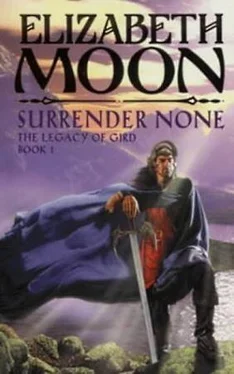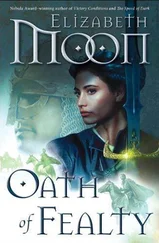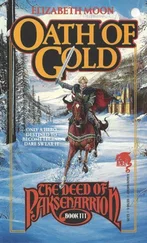Elizabeth Moon - Surrender None
Здесь есть возможность читать онлайн «Elizabeth Moon - Surrender None» весь текст электронной книги совершенно бесплатно (целиком полную версию без сокращений). В некоторых случаях можно слушать аудио, скачать через торрент в формате fb2 и присутствует краткое содержание. Жанр: Боевая фантастика, на английском языке. Описание произведения, (предисловие) а так же отзывы посетителей доступны на портале библиотеки ЛибКат.
- Название:Surrender None
- Автор:
- Жанр:
- Год:неизвестен
- ISBN:нет данных
- Рейтинг книги:3 / 5. Голосов: 1
-
Избранное:Добавить в избранное
- Отзывы:
-
Ваша оценка:
- 60
- 1
- 2
- 3
- 4
- 5
Surrender None: краткое содержание, описание и аннотация
Предлагаем к чтению аннотацию, описание, краткое содержание или предисловие (зависит от того, что написал сам автор книги «Surrender None»). Если вы не нашли необходимую информацию о книге — напишите в комментариях, мы постараемся отыскать её.
Surrender None — читать онлайн бесплатно полную книгу (весь текст) целиком
Ниже представлен текст книги, разбитый по страницам. Система сохранения места последней прочитанной страницы, позволяет с удобством читать онлайн бесплатно книгу «Surrender None», без необходимости каждый раз заново искать на чём Вы остановились. Поставьте закладку, и сможете в любой момент перейти на страницу, на которой закончили чтение.
Интервал:
Закладка:
In spring, the fighting spread eastward into Tsaia. Gird had not realized how far the barton organizations spread—not only in Marrakai lands, but beyond. Barton after barton rose, combined with its neighbors, and elected a marshal: most were competent. The Tsaian royal army which had at first treated the very idea of a peasant army with contempt, even after the defeat in Finaarenis, fell back again and again. Gird did not want his Finaarenisian troops to invade Tsaia: they had fought for their own freedom, in defense of their own homes and families. That much he had felt confident—that Alyanya, Lady of Peace though she be, could understand and condone. Invading someone else’s land, even for the best reasons, did not seem the same.
But Ivis, his high marshal in the east, had no such worries. Bartons were bartons; yeomen were yeomen; in any fight between peasants and lords, he wanted to be one of the leaders. Several cohorts volunteered to go to Tsaia with him. Gird, working hard on the new and—he hoped—simple legal system that would enable men to live in peace and deal fairly with one another, let him go with only a warning.
The legal code was, in fact, turning out to be much harder than he had expected. If he made the laws simple, they were so general that someone would claim not to know how that general principle could be applied in a particular instance. If he made the laws precisely applicable to common situations, someone would come up with an uncommon situation and claim to have found no guiding general principle. Gird tried to ignore the twinkle in Arranha’s eyes, but finally admitted that he had been as naive in law as in war.
“Not that you won’t end up with better law than we’ve had,” said Selamis, quite seriously. “I think it’s coming quite well.”
“Some of it,” growled Gird. It had been so simple to say that no one should beat up someone else, but now he was faced with honest merchants who had pursued thieves, and husbands convinced that they must beat their wives. And how much beating was beating? If a thief, once caught, kept fighting and had to be clouted before he would come along to a magistrate, was that a lawful or unlawful beating? Gird had insisted that the right to beat, within marriage, was both limited and equal for both sexes, but enforcement proved beyond his means. He felt at times like the father of a roomful of quarrelsome children, each of whom insisted that the other one started it.
Mercantile law proved equally tricky. Gird himself had gone around to three markets, taken a sample weighing stone, and found that no two were the same. He had one of the Brightwater masons cut one that matched the middleweight stone, had several more made to balance it, and replaced all the Brightwater weightstones with the standard. As the mason turned out more standards, Gird sent them to nearby markets, and insisted on their use. Prices danced up and down with the new stones. Gird assumed they would settle to something equivalent to those before, but his mental analogy—a chip on a bucketful of water, after shaking—did not satisfy him.
At least this year most of the arable land was under cultivation, and his noncombatant camp followers had returned to their homes or settled in partially deserted villages nearer by. Some of the bartons had dispersed as well, those that had villages to return to. Food should not be a problem, if the war stayed in Tsaia.
As the war receded eastward, the land that had been Finaarenis settled back into farming and trade. Some lands were blighted, some wells ruined; peasants shrugged and moved on. Some fields grew rich green grass over bones the crows had picked; those they avoided for another year. Gird moved from Brightwater to Grahlin, amused now to see how small a town it really was, that had seemed a city to him. Esea’s Hall there had been burned, by the local inhabitants; they showed him the charred foundations proudly. He moved on east, to camp near the Tsaian border for a time.
Tsaia fell, at last, with blue-shirted farmers calling themselves “Gird’s Yeomen” holding the king captive in his own dungeon. By the time word came to Gird, the king had escaped—and been found dead, of a magelady’s anger. The two messages came on the same day, in Ivis’s difficult script. Gird had tried to insist that his marshals, at least, must learn to read and write, but some had struggled as hard as he himself. He looked up from puzzling his way through it, having read it aloud, to meet Selamis’s steady gaze.
“So,” he said. “You are the last surviving magelord of rank, if you look at it the way you once did.”
Selamis shook his head. “No, you know I don’t.”
“You feel no slightest flicker of desire for that throne? They say it is lovely.” The throne of Finaarenis had been hacked to bits before Gird saw it.
“None. That was not my throne anyway, even if they wanted a king.”
Gird drew a long breath. “I suspect they do; there’s a different feel over there. Marrakai said their king was foolish, not cruel, and Marrakai is anything but a fool. It’s a land that might take lords, if they were not mages.”
Selamis looked down, pensive. “And where is a land that will take mages, if they are neither lords nor evil?”
“You think of yourself? You are safe with me.”
“I think of others like myself. I cannot be the only bastard with magic in his blood, that will someday bring him death at the hands of those for whom all magic is evil. Even some of the pure blood—that lady you sent away, and her children.”
Gird cocked his head. “If I had magic in my hands—if I could bring light, as you and Arranha can, whenever I needed a light to find my way; if I could light a fire with it, and never be cold—I would find that tempting. I would want to use it, first for myself, and then for those I loved, and then—I don’t know, friend luap, as you would be called—”
“I wish you would just call me Luap, as the others are doing now—”
“And forget who you are? I wish I could. But I see no way to use magic well, to have that much power others cannot share, with no force to bar misuse.”
Selamis waved at the papers Gird had been working over, another revision of the first part of his Code. “Your law?”
“Law without force behind it is but courtesy: for love or greed, men do things they should not, and law must have a hard hand to knock those hot heads into sense. For ordinary men, the law can serve, but what force can bind a mage?”
Selamis laughed aloud. “You did it yourself, Gird—a good knock to the head, as you say, and there I lay.”
Gird laughed too. “Yes, an untrained mage. By the gods, d’you suppose if I’d felled that sier in the first place he would never have fought against us?” A ridiculous idea, but he was in the mood for it.
“Mages are children first, Gird—good parents can teach them law.”
That sounded reasonable but he still had his doubts.
Then the Tsaian king’s killer sought sanctuary in his camp. He wondered what she would say about his death. Magedead, the report had been, from someone who claimed to know what that meant. A royal ring on his chest, and briars grown over him, in bloom even in this season. The season was autumn. Late autumn.
“Bring her in, then,” he said to Selamis-now-Luap.
“She’s a mage,” said Selamis. He meant more by that; Gird looked at him sharply.
“So?”
“She’s one of them, but not one of them.”
“One trying to do good, like the Marrakai?”
Luap looked away. “Not precisely. She had lived for years as a sheepherder.”
“A mageborn lady?”
“So those who knew her say. In exile from the Tsaian court, for some wrangle there—”
“And she comes to us. Why? Did she say?”
Читать дальшеИнтервал:
Закладка:
Похожие книги на «Surrender None»
Представляем Вашему вниманию похожие книги на «Surrender None» списком для выбора. Мы отобрали схожую по названию и смыслу литературу в надежде предоставить читателям больше вариантов отыскать новые, интересные, ещё непрочитанные произведения.
Обсуждение, отзывы о книге «Surrender None» и просто собственные мнения читателей. Оставьте ваши комментарии, напишите, что Вы думаете о произведении, его смысле или главных героях. Укажите что конкретно понравилось, а что нет, и почему Вы так считаете.












